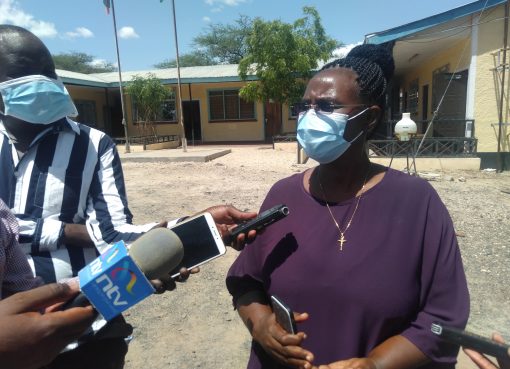The National Government has come up with a five year Strategic Plan to manage and develop grassland and rangeland whose implementation is projected to cost approximately Sh 9 billion.
State Department for Livestock Principal Secretary, Harry Kimtai, launched the Strategic Plan,Wednesday, which will be implemented in collaboration with key stakeholders, under the newly formed Grassland and Rangeland Society of Kenya (GRASK).
GRASK was formed as part of resolutions of the joint 24th International Grassland and 11th International Rangeland Virtual Congress held in October this year, to help address challenges and develop and manage grassland and rangeland in Kenya.
The Society will also mentor researchers and scientists who will continuously contribute knowledge and expertise in the critical area of the country’s economy.
Kimtai said the document will guide the National Government in developing regulatory framework, policies and legislations for the proper management of grassland and rangeland resources in the country.
“The Strategic Plan has been developed and will soon be shared with the stakeholders for public consultation in line with the Constitution of Kenya. The Stakeholders are expected to give their inputs and validate the document,” he said during the launch of the Strategic Plan at Bamburi Beach Hotel, Mombasa.
The GRASK Strategic Plan contains eight strategic issues of climate risk and community resilience, inadequate support of the community and leadership governance structures, lack of legal framework to regulate services providers in the grassland and rangelands, inadequate resources, professional capacity, information system and sharing, technological development and innovation and resources for grasslands and rangelands development.
Kimtai further observed that the strategies will guide the government and biodiversity stakeholders to find solutions into serious challenges facing the ecosystem depended on by human and wildlife populations.
Some of key challenges facing the country’s grasslands and rangelands depended on by over 36 percent of inhabitants, include increased land degradation, climate change and resource based conflicts leading to loss of Sh 2 billion annually due to mortality rate.
“These ecosystems support our grazing livestock as wildlife habitat, watersheds, recreation minerals, plant products and other associated uses. Despite all these benefits, the lands have continued to lack the basic foundations for social and economic development and the expected roles of ensuring food and nutrition security,” he added.
Kimtai noted that the vast rangeland resources endowed with enormous resources have great potential to the country through scientific research hence informed the government decision to facilitate formation of the society to bring together key experts.
“This Strategic Plan will help bring together researchers, practitioners and resource users in a round table whereby each stakeholder will have a role and there will be clear responsibilities. The strategic plan will not only provide guidance on resource governance, but also develop direction for professionals to steer and oversee ranger land management issues including support to human resource development and community extension support,” he added
The Strategic Plan was developed by a team from the State Department, Kenya Agricultural and Livestock Research Organization (KALRO) and the University of Nairobi.
KALRO Director General, Dr Eliud Kireger, said the Strategic Plan resonates with his agency’s overall goal on the management of rangeland and grassland ecosystems through cutting edge technologies and innovation.
Kireger added that the technologies and innovations include high yielding and adapted grasses for both high rainfall highland and the rangelands, integrated soil fertility management, conservation agriculture irrigation and drainage management technologies, agroforestry systems and bio-energy system technologies.
“Some of these technologies have potential to revolutionize the livelihood for the people who depend on the grasslands and rangelands. Specifically, the adoption of high yielding and adapted grasses is supporting the emerging and commercially viable hay value chain that is supporting the livelihoods of people depending on the grassland and rangeland resources. We are ready to partner with GRASK towards scaling and transfer of these important technologies and innovations,” he added.
He said they are KALRO scientists are currently improving and disseminating information on ways of increasing productivity of climate- smart livestock genotypes like Sahiwal, Boran cattle, Dorper sheep, Red Maasai and Galla goats to farmers in semi-arid and arid ecosystems.
Others present during the launch include Director Livestock Production, Bishar Fille Elmi and Principal Secretary, Crops Development and Agriculture Research, Francis Owino, who noted that the government has invested heavily in the development of the ranger and grasslands for sustainable crop production.
“If we fix our ranger and our grassland, then our country will be fixed. The universities will train and release scientists in the ranger land and grassland areas but we need institutions that will cater for the professional interests,” added Dr Owino.
International Union for Conservation of Nature (IUCN) Regional Representative, Charles Karangwa, was the Chief Guest during the event lauded the formation of the society and the interim committee for the exemplary performances in developing the strategic plan.
“Ranger land and grassland covers 41 percent and in Kenya 80 percent. It hosts Two billion people globally. We cannot undermine such a critical ecosystem,” added Karangwa.
He said his agency had for decades advocated for the need for communities to remain resilient towards climate changes to achieve food insecurity and nutrition security to withstand effects of hunger and drought.
Karangwa added “We need to put our science at work” to ensure the ranger land and grassland are sustainable manage for the prosperity of the population,”
While calling for inclusion of the private sector in the management and development of rangeland and grassland in the region, the regional IUCN boss further challenged researchers and scientists to use their knowledge, expertise and experiences to provide viable solutions to the challenges facing the ecosystems.
Karangwa further pledged to support resource mobilization to ensure the new outfit achieve its strategic plan including addressing the general transitional gap of scientists in the field experiencing natural attrition.
